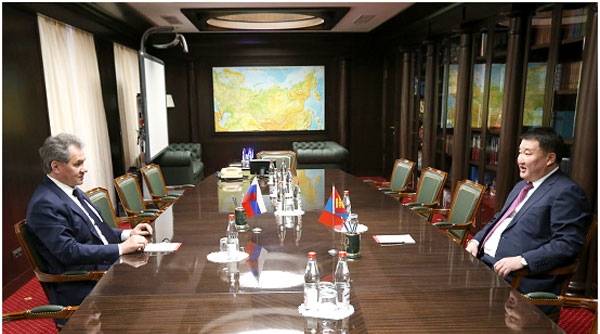
New Mongolian Minister of Defense Visits Moscow to Reaffirm Ties
Publication: Eurasia Daily Monitor Volume: 10 Issue: 52
By:

Mongolian Minister of Defense Dashdemberel Bat-Erdene led a Mongolian military delegation to Moscow on February 17–21 for discussions that included preparations for their annual joint exercises. Included on the agenda was a visit to the 5th Separate Motorized Rifle Brigade of the Western Military District in the Moscow Region (RIA Novosti, February 17). Bat-Erdene met with Russian Federation Defense Minister, Army-General Sergei Shoigu, in talks described by both sides as “cordial and constructive.” Possibly to smooth over the fact that he had not quickly paid an official visit to his Russian counterpart since his August 2012 appointment as Mongolia’s defense minister, Bat-Erdene emphasized that his trip was the first that he personally had led abroad: “I wished to start my foreign visits with Mongolia’s most reliable friend—the Russian Federation” (infomongolia.com, February 19).
For his part Minister Soigu emphasized the importance of maintaining friendly relations with Mongolia as one of the priorities of Russian foreign policy: “We have paid great attention to the organized structure and implementation of joint military field exercises and combat trainings that were organized in recent years” (infomongolia.com, February 19). The Russian side offered the Mongolians assistance in training military personnel at Russian military academies and to continue training young Mongolian cadets at the Suvorov Military School in Yekaterinburg.
Minister Bat-Erdene confirmed that more than sixty percent of Mongolians performing military training abroad today are in the Russian Federation. Such training programs appear to be Moscow’s response to the annual multi-national peacekeeping exercises in Mongolia called Khaan Quest that are conducted under the aegis of the General Staff of the Mongolian Armed Forces and United States Pacific Command (USPACOM). Russo-Mongolian military training was revived in the democratic era only in January 2010 when Mongolia began sending cadets to Omsk Cadet Military School. After September 2011, cadet training was transferred to Suvorov. The Suvorov Military School, established in 1943, has graduated 16,000 soldiers to date. The 18 Mongolian cadets currently enrolled there are the first foreign students in this institution. Many are children of Mongolian military generals and officers who were educated in the Soviet Union. After these cadets graduate in 2013, they will go on to Russian military academies (infomongolia.com, July 20, 2012).
Among other topics of the bilateral discussions were preparations for the now annual Russian-Mongolian joint military field exercises, held every fall since 2008, either in Mongolia or Russia’s Eastern Military District (OIE). Last year’s exercises, “Selenga 2012,” focused on defeating a simulated terrorist attack and securing the area afterward (ITAR-TASS, September 21, 2012). Since the September 2012 joint exercises took place in Buryatia, this year Mongolia will be the host. Defense Minister Bat-Erdene also suggested both sides begin planning for the 75th anniversary celebration in 2014 of the Khalkin Gol joint victory by the Soviet Army and Mongolian Revolutionary Army over the Japanese Kwantung Army in eastern Mongolia (infomongolia.com, February 19).
Chinese media sources also reported on the Bat-Erdene visit to Russia (Xinhua News Agency, February 19) for economic as well as defense-related reasons. Bat-Erdene, a self-made wealthy oligarch who graduated from the Ural State University in Sverdlovk in 1987, is president of the Ajnai Corporation. A major Gobi region construction, alcohol and tourism company, Ajnai Corporation will build Mongolia’s first heavy-duty paved road to the Chinese border and a 20,000-hectare Industrial Park called “Bayan Gobi Nutag” in the South Gobi that will include the country’s first coke-chemical plant, 12-megawatt (MW) power plant and coal-washing plant (Mongolia Weekly, April 25–29, 2011). Bat-Erdene previously served in the Mongolian parliament from 2004 to 2008 as a Democratic Party (which dominates the present coalition government) member and is known for advocating a more “resource nationalist” mineral development policy that is particularly aimed at limiting Chinese investment in Mongolia’s economy (Daily News, mongolianviews.com, May 18, 2010). The Mongolian defense minister is still chairman of the board of Tavan Tolgoi JSC, which both extracts coal from its own small-scale mine and holds the coal transport contract for the country’s potentially largest coal/uranium mine at Tavan Tolgoi (TT), 240 kilometers (125 miles) north of the Chinese border (ubpost.blogspot.com, August 1, 2007). All of TT’s extracted coal was being exported through Bat-Erdene’s company to China until January of this year when the TT state-managed company Erdenes Tavan Tolgoi LLC (ETT) announced that it had no more funds to pay for the approximately 18 million annual tons of coal transports, even though the Chinese already had made the required payment. Furthermore, ETT is threatening to completely cancel its coal-for-loan deal with the Chinese importer, Aluminum Corporation of China (Chalco) (www.business-mongolia.com, January 22). These actions have led to serious tensions in Sino-Mongolian relations and upset the international financial community.
It is likely that Bat-Erdene discussed the TT situation in Moscow because the Russian government is very interested in how this huge mine will be exploited and where its products, especially the uranium, are destined. When the western portion of TT was opened in 2011 by the Mongolians for development in an international bidding process, US coal giant Peabody Energy and the Chinese SOE Shenhua were among the finalists. Because of a strong negative reaction from Moscow, however, a Russian-South Korean-Mongolian consortium was summarily added to the short bid list, provoking international protests that have held up foreign investment for more than one year (see China Brief, February 1).
Bat-Erdene had arrived in Moscow after completing a first ever trip with Mongolian President Tsakhia Elbegdorj to visit Mongolian peacekeepers in Juba, South Sudan, on February 15. Of the United Nations peacekeeping force currently serving in Sudan, one-sixth is made up of Mongolians—850 soldiers and 7 staff officers. Several weeks prior to this visit, Minister Bat-Erdene had issued a one-time compensation package of $800–$1,200 to these peacekeepers (infomongolia.com, February 1). For over ten years, Mongolia has been very active in UN peacekeeping operations, with some 10,000 of its soldiers having taken part in missions abroad (infomongolia.com, February 18; sudantribune.com, February 17). Nevertheless, Ulaanbaatar’s bilateral military relationship with Moscow remains a priority for Mongolia, which sees Russian support as a key factor in training the Mongolian armed forces for modern security realities, not to mention as a possible balance against Chinese economic and political dominance.




